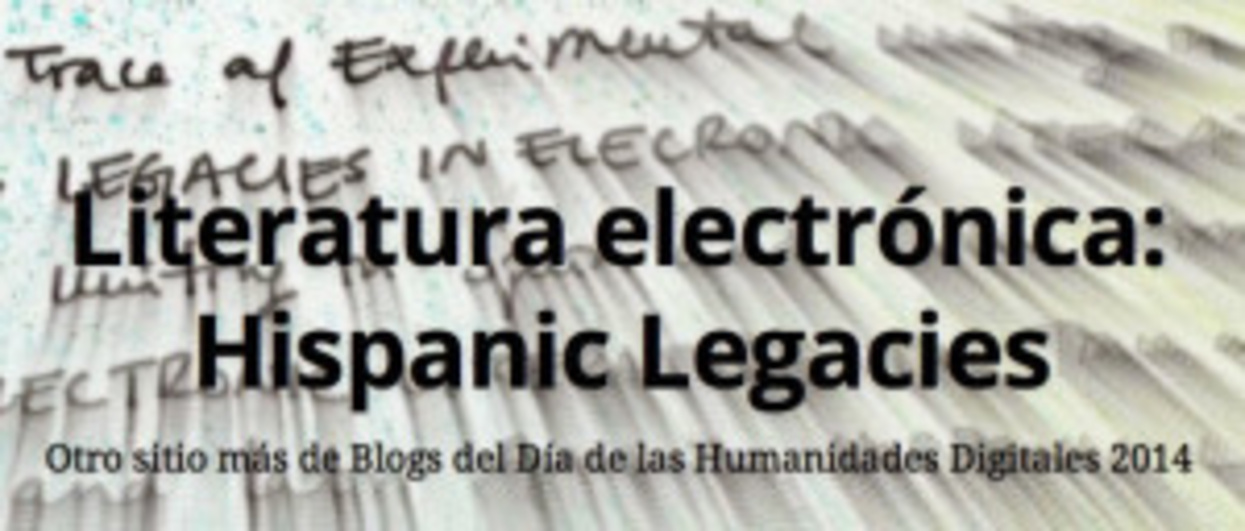Alex Saum-Pascual E-Literature Class Funded by Digital Humanities

thumbnailWe're thrilled to see that Alex Saum-Pascual's (Spanish) new electronic literature course has been funded by Digital Humanities at UC Berkeley! This Fall, Alex is developing an upper division undergraduate course for Spring 2016 that will combine humanities literary analysis with basic programming skills, DH tools, and methods. Students will learn how to write and talk about electronic literature, such as hypertext novels, kinetic poetry, automatic generators, and social media fictions, among others. Not only will students be able to critique and analyze electronic art and literature learning the specific terminology and theoretical frameworks, but they will also gain the skills to build their own digital art pieces in a collaborative workshop setting.
Students’ work will be displayed at No Legacy || Literatura Electrónica, an electronic literature exhibit in Doe Library’s Brown Gallery from March to August 2016.
To learn about the other courses that have been funded by this great program, visit http://digitalhumanities.berkeley.edu/funded-coursesprojects
ELECTRONIC LITERATURE: A CRITICAL WRITING & MAKING COURSE (SPRING 2016)
ALEX SAUM-PASCUAL
Trying to bridge the gap between artists and critics, or between creators and more traditional humanities scholars, Electronic Literature: A Critical Writing & Making Course is an undergraduate class that engages in the critical making of digital literature together with the analysis and writing of scholarly essays on related topics. Electronic Literature: A Critical Writing & Making Course is a hybrid course that combines humanities literary analysis with the teaching of basic programming skills, DH tools and methods.
Electronic Literature: A Critical Writing & Making Course would be a special topics, upper division, undergraduate writing class, where students learn how to write and talk about electronic literature (e.g. hypertext novels, kinetic poetry, automatic generators, social media fictions, etc). Not only will they be able to critique and analyze electronic art and literature learning the specific terminology and theoretical frameworks, but also they will gain the skills to build their own digital art pieces in a collaborative workshop setting. Thus, Electronic Literature: A Critical Writing & Making Course would be a semester long course that incorporates academic research tools and resources, and practical, hands-on work.
The course would be divided in two modules: critical writing and critical making. The first module deals mainly with improving students writing skills and critical analysis on aspects particular to electronic literature: changes in authorship models (cyborg authorship and posthumanism, for example), questions of originality (unoriginal genius, remix, etc), challenges in textual ontology (code ontology vs. print ontology), among others. It will improve students reading and writing skills in Spanish through the reading and writing of critical essays both in English and Spanish. These written assignments will exercise students’ presentational and analytical skills. Nonetheless, the course will be taught mostly in Spanish, adapting students’ course work to their needs. Those students taking the class to fulfill their Spanish major or minor requirements will write their critical essays in Spanish, while those coming from outside the department can opt to write in English. This would expand the scope of the class and may help with the recruiting of majors.
The writing of Electronic Literature is an interdisciplinary endeavor, and different genres require different skills. Hence, the second module of the class incorporates the learning of DH tools and methods related to different E-Lit genres: Kinetic Poetry, Permutators and Generators, Hypertext Narratives, Geo-Location Literature, and Social Media Fictions. All students will be introduced to each genre’s main tools, languages and their poetic and artistic applications and history, but they will specialize in one in particular for their final projects. By workshopping their own creative pieces, students gain scholarly insights only obtained by engaging in this type of practice-based research.
